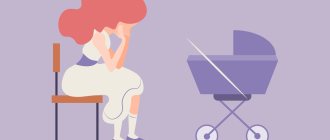The death of a loved one makes you depressed for many reasons, which can affect a person’s emotional state at the same time. That is why it is especially difficult for her to experience. The specific “set” of reasons differs from one person to another. And therefore, depression after the death of a husband, son, mother or other person can be different. As well as ways to get rid of it.
Today we will look at its causes and provide recommendations on how to get out of depression after the death of a son, husband (or other loved one).
Causes of depression
Depression after death is caused by many factors, namely:
- Dependence on the deceased.
- Subjective feeling of destruction of prospects.
- Resentment and guilt.
- Inability to cope with stress.
- A pessimistic view of the world.
- Low volitional potential.
There are, in fact, much more reasons. These are just the most common ones. As a rule, they are closely intertwined with each other, and it is not clear which comes first. Let's look at each of these factors in more detail.
Signs of Grief
Psychologist Erich Lindemann identified a list of symptoms of loss that absolutely everyone who has lost a loved one faces:
- physiological – difficulty breathing, weakness, throat spasms, dry mouth, emptiness in the abdominal area;
- behavioral – inertia, apathy, insomnia, permanent weakness, inconsistency, fussiness;
- cognitive – constant doubts, problems concentrating, confused thoughts;
- emotional – a feeling of complete helplessness, loneliness, panic attacks, increased anxiety, guilt.
If you notice such signs in your friend, it means that he does not know how to live after the death of a loved one and needs professional help.
Dependence on a deceased person
If a person who has lost someone close was dependent on him, then death leads to the question: “How can I continue to live?” The problem here is not only that a loved one has passed away, but also a feeling of inability to adapt to future life. Before you get rid of depression, you first need to understand which of these types of addictions work specifically in your case.
- Material dependence. For example, if depression occurs after the death of the husband, who was the breadwinner of the family. The problem can be solved simply - you need to learn how to make money. Of course, she will not resurrect a dead man, but the emotional burden will be significantly reduced.
- Intellectual addiction. This is when the deceased was a bearer of some knowledge, acted as a teacher, and was in authority with loved ones. And when he dies, a person feels incapable of making decisions. The problem can be solved simply by replenishing intellectual capital. Read books, think, learn to make decisions on your own. It is worth remembering that any crisis situation is associated primarily with opportunities, which can only be taken advantage of through training. The saying “study, study and study again” works at all times, in all centuries.
- Emotional dependence. This is when a person can only receive a feeling of satisfaction with life, happiness, and joy from other people. And when death comes to someone who evoked positive emotions, his dependent relative or friend loses his only source of joy. Naturally, hence the depression. The problem is solved by developing emotional intelligence, training skills to manage one’s own emotions, and self-motivation.
All ways to solve this problem are aimed at one thing - gaining independence. First, you need to seriously ask this question and actively try to find an answer to it. We, of course, will provide tips on gaining personal independence, but do not forget that each person is individual and so is his situation. You need to develop your own style of achieving goals that is convenient for you. But here are some recommendations:
- Think often about how to achieve your desired goal. Try to look at yourself objectively from the outside. To be self-sufficient, you need to be your own educator.
- Train your willpower. This is the main quality that characterizes a person as self-sufficient and independent. It is this that will help you implement the conclusions that you drew from the situation into life.
- Constantly learn. A self-sufficient person is one who can do more than his immediate environment. And to expand the scope of your capabilities, you need to constantly learn something new.
Stages of experience
At first, a woman does not think about how to get out of depression after the death of her husband, because she has not yet realized what happened. All this seems to her like an absurd dream that will soon end. It is during this period that the widow experiences a severe psychological blow and is in a state of shock.
.
Gradually, she begins to experience the first bouts of hysteria and uncontrollable sobbing. The widow's behavior becomes uncontrollable
. A woman may begin to blame herself for not having time to do anything to save her husband, but most often all such accusations are imaginary.
Young wives may begin to hate everyone around them. The widow feels that other people are unfairly happy with their significant other
. How to get out of depression after the death of your husband, if everyone around you is enjoying life, is not an easy question.
An acute and overly violent reaction is gradually replaced by apathy. Mental pain turns into dull and aching
.
At this stage, the widow denies what happened, not wanting to come to terms with it. She surrounds herself with gifts, personal belongings and photographs of her husband, listens to audio recordings of his voice and watches home videos
.
At the same time, the woman becomes fixated on grief
. She does not pay attention to what has nothing to do with her husband.
If the symptoms of depression in women do not go away for too long, then this already leads to harm to the body. Today, statistics show many cases of widows dying one or two years after saying goodbye to their spouse.
Feeling of prospects being destroyed
This feeling appears when the person who was irretrievably lost had goals and plans that could not be achieved. In this case, the best solution is to develop new perspectives. Your actions should proceed from a surplus approach - make the most of the existing unpleasant situation for personal growth and improve your life.
Of course, working out the prospects will take more than one day. But this needs to be done. And the more time you devote to this, the faster this cause will be eliminated.
You can work out the prospects like this:
- Create a file in Evernote or any other application that supports automatic synchronization and write down ideas on how you can improve your life after this situation. Of course, you can work purely with a computer, but online notepads are better because you can immediately write down an idea if you have your phone at hand. This must be done throughout the transition period.
- Start implementing the ideas that come to mind. It is clear that in depression the most difficult thing is to start doing something; volitional potential is reduced almost to zero (especially in deep depression). But if you regularly take small, feasible steps, over time you will get carried away and even enjoy transforming your life.
One business coach essentially did just that. After the death of his wife, he began to work more actively, which contributed to the growth of his professionalism, the number of clients, and earnings. But the main thing here is not to go to the other extreme - try to go to work so as not to think about the loss. In this case, we are essentially replacing one dependency with another. Our task is to become self-sufficient people. You can use work to take your mind off your grief, but only if it helps you become stronger and actually overcome depression, not drown it out.
Resentment and guilt
It happens that depression is caused by resentment towards another person that he has died. Yes, this happens in psychological practice, and quite often. This, of course, is irrational, but only irrational beliefs can plunge you into depression.
Another common reason is guilt. A person may feel that if he had done or not done something, the other person would not have died. As a rule, this is an irrational feeling (since he is only so smart now, and then he objectively did not know that this action could lead to death. Or, in general, there is no connection between that action, which may or may not have happened, and death relative).
Here you need to constantly remind yourself that you then acted in the best way available to you. Well, you didn’t know what to do then. And every time you feel irrational guilt, remember this.
Of course, it also happens that a person is really to blame. In this case, it is not necessary to eliminate emotions, but to draw conclusions. Yes, you made a mistake. Sometimes mistakes are costly. But this is the price that had to be paid for a very important lesson that will not be written in any book.
So in this case, you need to think about what conclusions you need to draw. There is nothing you can do; you won’t be able to correct the error. But it is very important to use the findings in real life.
Guilt and depression
Stage 3 - feeling of guilt: moments of communication are remembered, and there is always the thought that they were not attentive enough, why at the moment of death they were not there, did not hold hands, did not say goodbye, did little to help not die. For some, this feeling of guilt remains for the rest of their lives, even when everything has passed, but this apparently depends on the subtlety of a person’s nature.
The next stage is depression: a person gives up, he no longer has the strength to hide his emotions, he is energetically exhausted, very sad, does not believe that he can be reborn, avoids sympathy, does not give vent to negative thoughts and this makes him even more unhappy; There may be a strong feeling of emptiness. Then comes acceptance of what happened, and with acceptance comes relief and reduction of pain: the person comes to terms with what happened. Anger and depression begin to let go, weaken, the person feels that he is able to pull himself together and start a new life, albeit without a mother. In order for a person to get out of a situation, he needs help.
Inability to cope with stress
Stress resistance is an extremely important quality that helps to endure even the most difficult situations. If a person does not have it, the likelihood of depression increases several times. This is because there is no inner confidence that he will cope and be able to survive the situation.
Depression in this case is often triggered by learned helplessness. This is when a person does not even try to improve his situation, although he has opportunities. He admits to his own powerlessness in almost any situation.
Some tips for developing stress resistance:
- Solve problems, don’t try to avoid them or pretend they don’t exist.
- Meditate and learn relaxation techniques.
- Actively maintain social connections. Of course, you absolutely don’t want to do this when you’re depressed. It even seems that there is no need to communicate with people, and this will only do harm. In fact, this is an illusion. A socially active person is less likely to fall into depression and recovers from it more easily.
You can follow these recommendations at any age.
"Amitriptyline"
An excellent antidepressant can be purchased for just 100 rubles at the nearest pharmacy without a prescription. These pills help relieve depression and neurotic symptoms.
The drug is an excellent answer to the question of how to survive depression after the death of your husband. He is respected by psychotherapists and most of their patients. After taking the pills, side effects may appear, but they will pass quickly enough
. It could be:
- dry mouth;
- constipation;
- dizziness;
- convulsions;
- tachycardia.
The course of taking the pills must be prescribed by the attending physician. If you follow all the recommendations of a specialist, then the question of how to get out of depression after the death of your husband will automatically disappear
. An antidepressant in just a few weeks can lift a person out of the deepest depression and return him to normal life.
Pessimistic view of the world
Pessimists do not get depressed, they only sometimes get out of it. Moreover, they very often say: “So this is reality. There is no need to look at the world through rose-colored glasses." Let's start with the fact that optimism and pessimism are illusions. The important thing here is not how realistic you look at things, but whether such a worldview helps you.
And, as a rule, an optimistic outlook often inspires, forces a person to act, actively overcome depression, and establish new interesting social connections. In addition, optimism helps to cope with absolutely any difficulties.
Low volitional potential
Weak will is very closely related to learned helplessness. In addition, the lack of self-control skills prevents you from introducing something new into your life and actively getting out of depression. A weak-willed person will not follow any of the recommendations on how to get out of depression after the death of a mother, wife or someone close. Moreover, not because I don’t agree with the recommendations, but because I’m simply lazy.
A weak-willed person can go to great lengths: binge drinking, overeating and other consequences of weak will, which will only aggravate the manifestations of depression. In general, in order to cope with depression after the loss of a loved one, train your willpower.
Meditation trains willpower very well. Volitional potential is closely related to the ability to concentrate on a task. Meditation trains this ability. In addition, it relaxes, and in itself can significantly reduce the symptoms of depression.
Renaissance
After the death of a mother or another loved one, in any case, the next stage begins - rebirth: an understanding of the need to accept new conditions comes, the survivor withdraws into himself, becomes silent, uncommunicative, and always seems to be analyzing something. This period is perhaps the longest; it can last up to several years.
At the last, 7th stage, a person changes, all stages of grief have been passed, life has become different, reached a new level. Many people strive to find new friends, supporters, and a change of environment. Some move to another city, change jobs, so that nothing returns to the past. A person understands that life goes on, he begins to realize that for his mother, death was liberation, and then he no longer worries about her, but about the fact that she is not with him.
But it doesn’t always go through 7 stages; sometimes a person remains at the stage of depression, fixed on his tragedy. A sign of depression after a loss is apathy: everything is painted in black, interest in life disappears, a person does not return from the past, he remembers the departed, communicates with him in his thoughts, there may be sleep disturbances or insomnia, mechanical absorption of food or refusal of it, melancholy , anxiety, feeling of hopelessness, desire to die. If there are at least 3 of these symptoms and it has lasted for more than 3-6 months, a diagnosis of depression is made. Depression after death is more severe when a person has witnessed the sudden death of a loved one.
Depression no longer goes away with the usual crying of tears; a person may not remember the reasons for his condition, everything becomes so hopeless for him. In a normal situation, when a person is still in grief, he can allow moments of joy, but with depression this is not the case; melancholy and despair are constant. With depression, there is a constant feeling of guilt, thinking and motor skills are inhibited, speech is slow, there may be hallucinations, apathy, indifference to the environment, even to the dirt in the house, inactivity, and constipation develops. Tearfulness and anticipation of problems and troubles are often added.
In such cases, they turn to a psychologist and psychiatrist. Psychotherapy is often effective and helps to get out of the situation after the death of loved ones. How can a psychotherapist help you? To be there in moments of worry, to help you go through all the stages, to restore strength after loss, to maintain mental health and to prevent the consequences of grief.
conclusions
We looked at the causes of depression after the death of a very close person. How to get out of it? In fact, everything is not as complicated as it might seem at first glance. Anything large can be broken down into small parts. It’s the same with complex actions. You will still have to follow simple steps. But you have to force yourself to do them. This is the hardest thing to do in depression. But only you yourself can get out of this state and recover after the death of your spouse, father, boyfriend, elderly relative, and even an animal (a cat, for example).
It makes no difference whose loss you experienced. In general, advice on how to overcome depression is universal. In most cases, medications and expensive treatment will not even be required. You can free yourself from depression and remove the cause, not the symptom, on your own.
People often ask how long does depression last, how long does it take to treat it? It all depends on the person himself and the circumstances in which he finds himself. Some people will be able to overcome despondency and depression in a week, others in a month. And some will stay there for years. Yes, your beloved child, dad, wife are gone, but there is a way out of the state that oppresses you. The main thing is not to worry and help yourself. Unfortunately, many do not do this after their parents or other relatives die. As a result, they remain depressed for years.
Stages of acceptance
Mourning, grief, depression after the death of a mother is a natural reaction of a normal person. After all, all the best that a person has was connected with your mother; her love always protected and protected you. Without a mother, a person feels orphaned. But if the state of grief drags on, disrupting the entire way of life, destroying the person himself, then we are talking about depression.
Grief after the death of a loved one, according to psychologists, goes through several stages:
- Negation.
- Anger.
- Guilt.
- Depression.
- Acceptance of what happened.
- Revival.
- Creating a new life.









